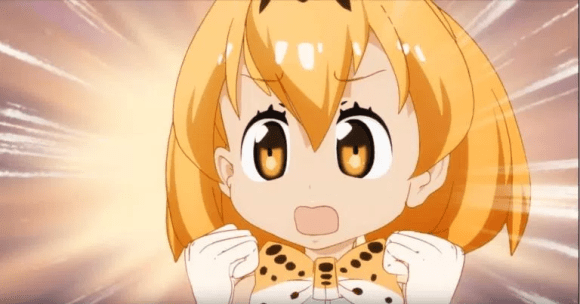
According to Yoshitada Fukuhara, anime may be the only thing left to save Japan’s economy.
On 5 December, Yoshitada Fukuhara, producer of the smash hit 2017 anime Kemono Friends, posted a bleak statement on his Twitter account.
“Although the animation industry in China has just begun, I’m convinced they will overtake us in production in three years and in skill in five to ten years.”
中国のアニメ産業は始まったばかりではあるが、生産で3年技術で5から10年で追い抜かれるだろうなと確信。言い方難しいけど中国に組んで"頂ける"のは後数年かなと思います。それ以降は日本と共同事業するメリットが中国にない。
— 福原慶匡 (@fukuhara_ystd) December 5, 2017
Some of Fukuhara’s followers had pointed out that China had already overtaken Japan in terms of production quantity and that their techniques with 2-D and 3-D animation were already at respectable levels. However, Fukuhara is saying that while that is true of children’s programming, Japanese animation’s true appeal abroad is with its more sophisticated, adult-oriented content.
▼ Kemono Friends
Currently, China and Japan are collaborating on animation projects, but Fukuhara suspects that this arrangement has no future for Japan. Once Chinese animators learn all of the tricks of the trade, continuing to work with Japan simply wouldn’t make much business sense to them.
▼ Hitori no Shita The Outcast is an example of the recent state of Chinese animation
The problem lies in Japan’s attitude towards this arrangement. Many in the anime industry and fandom see Japan as an invincible god of animation, granting it’s wisdom to China who will forever be its grateful pupil. However, given the staggering speed of China’s growth, that would be a fatally naive view of the situation.
Also, let’s say China elevates their animation to that of the high standards of Disney. Disney can still compete because of their family-oriented content that can pass through China’s strict government regulations and into their vastly lucrative market. However, Japanese animation studios, whose content often contains violence and sexuality, have to navigate the finicky nature of these censors to even begin to compete with more savvy domestic studios.
▼ For example, Bludgeoning Angel Dokuro-chan may have some red tape to hurdle before entering the Chinese market.
Meanwhile, back in Japan, many of the traditional industries like cars and electronics are beginning to dwindle. We have already seen signs with the video game market shrinking considerably in recent years. Fukuhara points out that even sumo has become largely dominated by Mongolians.
In this quickly changing global marketplace there are currently two things that Fukuhara believes Japan can still be competitive in: anime and Japanese food.
To make matters worse, the producer says Japan has been coasting on the goodwill provided by anime classics of his predecessors. Fans of these films and series are now largely entering their 30s leaving little on the level of Sailor Moon, Dragon Ball, or Ghibli for the new generations to latch onto, while also leaving the door open for something fresh and new… something from China perhaps?
▼ The Chinese-produced Reikenzan: Hoshikuzu-tachi no Utage has broadcast on Japanese TV and received a warm reception.
So, Japan must first reevaluate its standing in the world, at least in terms of animation, and then begin to nurture it’s own creators so that they can develop sophisticated art that can be duplicated but not imitated. While this holds true for any of the arts, anime is still has a head start for the time being.
Although it is rather unpleasant news, netizens in Japan seemed to concur for the most part.
“We are being pushed back to the final line of defense…”
“I think it’s because Japan is becoming too conservative, focusing on lower-risk and cheaper-to-produce manga and so on.”
“I’m not angry or disgusted by what China is doing, but the news is frustrating. But maybe it is the wake-up call modern Japanese society needs.”
“China’s otaku culture is quite amazing… I think it will grow steadily.”
“China, Korea, and Taiwan have been making tremendous progress. Japan has milked its artists with weak wages and poor working conditions, the industry was stupidly short-sighted and didn’t make itself sustainable for future generations.”
“Ah, China will probably break out into civil war before then anyway.”
While the possibility of civil unrest is never a prudent basis for financial planning, that last comment does remind us that it is impossible to see where things will go from here with certainty.
The 37-year-old Fukuhara should be old enough to remember the days when the USA was ringing remarkably similar alarm bells about Japan’s skyrocketing economy throughout the ’80s. While significant changes occurred in both countries during that time, it wasn’t quite the wholesale takeover of America that many feared.
That being said, it is certainly wise advice for Japan, or any country for that matter, to take a really objective look at itself to avoid making poor decisions. And if Japan and China do go toe-to-toe in anime, at least Japan has the far better portmanteau. “Chinamation” sounds kind of contrived and “Chinanimation” is too much of a work-out to pronounce. “Panamanimation,” on the other hand, would rule the world if the Central American country ever masters the art.
Source: Twitter/@fukuhara_ystd, Hachima Kiko
Top image, video: YouTube/TV Anime Kemono Friends Official

 Japanese actress wows in stunning edible dress made of vegetable slices【Video】
Japanese actress wows in stunning edible dress made of vegetable slices【Video】 Home of Japan’s anime-loving penguin has new tie-up event, may create another animal otaku
Home of Japan’s anime-loving penguin has new tie-up event, may create another animal otaku Japan’s 10 best singing voices as chosen by people in the industry
Japan’s 10 best singing voices as chosen by people in the industry What some Japanese people think of China is as stereotypical as you can get
What some Japanese people think of China is as stereotypical as you can get 9 ‘Spiritually Japanese’ Cosplayers, Cartoonists Arrested in China For ‘Anti-China Extremism’
9 ‘Spiritually Japanese’ Cosplayers, Cartoonists Arrested in China For ‘Anti-China Extremism’ How to order snacks on a Shinkansen bullet train in Japan
How to order snacks on a Shinkansen bullet train in Japan Demon Slayer: Kimetsu no Yaiba gets new roller coaster attractions and food at Universal Studios Japan
Demon Slayer: Kimetsu no Yaiba gets new roller coaster attractions and food at Universal Studios Japan Nintendo history you can feel – Super NES, N64, and GameCube controllers become capsule toys
Nintendo history you can feel – Super NES, N64, and GameCube controllers become capsule toys New Nintendo Lego kit is a beautiful piece of moving pixel art of Mario and Yoshi【Photos】
New Nintendo Lego kit is a beautiful piece of moving pixel art of Mario and Yoshi【Photos】 Japan’s new difficult-to-drink-from beer glass protects your liver, but it’s a brutal experience
Japan’s new difficult-to-drink-from beer glass protects your liver, but it’s a brutal experience A visit to the best UFO catcher arcade in the universe!
A visit to the best UFO catcher arcade in the universe! To combat declining birth rate, Japan to begin offering “Breeding Visas” to foreigners
To combat declining birth rate, Japan to begin offering “Breeding Visas” to foreigners Tokyo Station’s perfect breakfast spot might just be this izakaya Japanese-style pub
Tokyo Station’s perfect breakfast spot might just be this izakaya Japanese-style pub Sex doll sharing service shut down by Chinese authorities
Sex doll sharing service shut down by Chinese authorities High-fashion Totoro cuddle purse is like an elegant stroll in the forest【Photos】
High-fashion Totoro cuddle purse is like an elegant stroll in the forest【Photos】 Hello, cosmetics! Clinique teams up with Hello Kitty this summer for first-time collaboration
Hello, cosmetics! Clinique teams up with Hello Kitty this summer for first-time collaboration “The most Delicious Cup Noodle in history” – Japan’s French Cup Noodle wins our heart【Taste test】
“The most Delicious Cup Noodle in history” – Japan’s French Cup Noodle wins our heart【Taste test】 Starbucks releases a cute Frappuccino and Unicorn Cake…but not in Japan
Starbucks releases a cute Frappuccino and Unicorn Cake…but not in Japan Kyoto Tower mascot termination reveals dark side behind cute Japanese characters
Kyoto Tower mascot termination reveals dark side behind cute Japanese characters McDonald’s Japan’s Soft Twist Tower: A phantom ice cream only sold at select branches
McDonald’s Japan’s Soft Twist Tower: A phantom ice cream only sold at select branches Yabai Ramen: What makes this Japanese ramen so dangerous?
Yabai Ramen: What makes this Japanese ramen so dangerous? Finally! Nintendo Japan expands Switch 8-bit controller sales to everybody, Online member or not
Finally! Nintendo Japan expands Switch 8-bit controller sales to everybody, Online member or not Japanese government wants to build luxury resorts in all national parks for foreign tourists
Japanese government wants to build luxury resorts in all national parks for foreign tourists 10 things you should buy at 7-Eleven in Japan
10 things you should buy at 7-Eleven in Japan Studio Ghibli releases anime heroine cosplay dresses that are super comfy to wear
Studio Ghibli releases anime heroine cosplay dresses that are super comfy to wear Woman charged for driving suitcase without a license in Osaka
Woman charged for driving suitcase without a license in Osaka Studio Ghibli unveils My Neighbour Totoro miniature house model
Studio Ghibli unveils My Neighbour Totoro miniature house model Kyoto experiencing problems with foreign tourists not paying for bus fares, but not on purpose
Kyoto experiencing problems with foreign tourists not paying for bus fares, but not on purpose Fighting mild hunger with a Japanese soda that turns into jelly in the stomach【Taste test】
Fighting mild hunger with a Japanese soda that turns into jelly in the stomach【Taste test】 Studio Ghibli’s Howl’s Moving Castle tapestry unveiled in Japan for first time
Studio Ghibli’s Howl’s Moving Castle tapestry unveiled in Japan for first time McDonald’s new Happy Meals offer up cute and practical Sanrio lifestyle goods
McDonald’s new Happy Meals offer up cute and practical Sanrio lifestyle goods Sales of Japan’s most convenient train ticket/shopping payment cards suspended indefinitely
Sales of Japan’s most convenient train ticket/shopping payment cards suspended indefinitely Sold-out Studio Ghibli desktop humidifiers are back so Totoro can help you through the dry season
Sold-out Studio Ghibli desktop humidifiers are back so Totoro can help you through the dry season Japanese government to make first change to romanization spelling rules since the 1950s
Japanese government to make first change to romanization spelling rules since the 1950s Foreigner’s request for help in Tokyo makes us sad for the state of society
Foreigner’s request for help in Tokyo makes us sad for the state of society Ghibli founders Toshio Suzuki and Hayao Miyazaki contribute to Japanese whisky Totoro label design
Ghibli founders Toshio Suzuki and Hayao Miyazaki contribute to Japanese whisky Totoro label design Doraemon found buried at sea as scene from 1993 anime becomes real life【Photos】
Doraemon found buried at sea as scene from 1993 anime becomes real life【Photos】 Tokyo’s most famous Starbucks is closed
Tokyo’s most famous Starbucks is closed Princesses, fruits, and blacksmiths: Study reveals the 30 most unusual family names in Japan
Princesses, fruits, and blacksmiths: Study reveals the 30 most unusual family names in Japan Japanese zoo penguin falls in love with cutout of cute anime penguin girl
Japanese zoo penguin falls in love with cutout of cute anime penguin girl Rumour: Sony and major Chinese investor in talks re: bringing PlayStation 4 to China
Rumour: Sony and major Chinese investor in talks re: bringing PlayStation 4 to China Picture-perfect, totally accidental anime cosplay gives Japanese otaku a new friend【Photos】
Picture-perfect, totally accidental anime cosplay gives Japanese otaku a new friend【Photos】 This is a pretty worrying chart for China’s demographic future
This is a pretty worrying chart for China’s demographic future The dirty reason China can’t always tell North Korea what to do
The dirty reason China can’t always tell North Korea what to do Heartbroken visitors leave tributes to Japan’s anime-loving penguin Grape-kun at new memorial
Heartbroken visitors leave tributes to Japan’s anime-loving penguin Grape-kun at new memorial 16 facts about China that will blow your mind
16 facts about China that will blow your mind This table tennis comedy video isn’t “boring.” It may be the best video ever!
This table tennis comedy video isn’t “boring.” It may be the best video ever! Studio Ghibli’s The Boy and the Heron now has an English dub trailer from its Hollywood-star cast
Studio Ghibli’s The Boy and the Heron now has an English dub trailer from its Hollywood-star cast China’s Special Forces in Hong Kong go through a ridiculous training regimen
China’s Special Forces in Hong Kong go through a ridiculous training regimen China’s ‘Rent-a-Foreigner’ industry is booming
China’s ‘Rent-a-Foreigner’ industry is booming Chinese businessman sets his sights on driving Disney Resort out of Shanghai
Chinese businessman sets his sights on driving Disney Resort out of Shanghai Chinese government uses character bearing uncanny resemblance to Mario in anti-corruption video
Chinese government uses character bearing uncanny resemblance to Mario in anti-corruption video
Leave a Reply